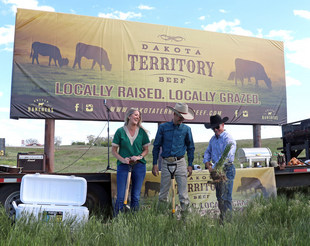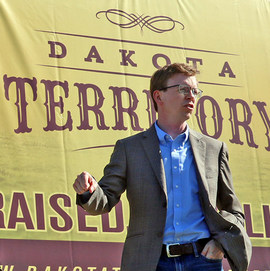![]()

Groundbreaking ceremonies were held south of Hot Springs Wednesday for the United Ranchers Cooperative’s Dakota Territory Beef plant.
The rancher-owned facility will cost about $2-million dollars and could be open as soon as early next year.
Co-op President Neil Sanders hosted along with fellow board member and Chadron State College rodeo coach Dustin Luper, and co-op marketing head Julie Ellingson.
Sanders told the crowd at the site along Hwy 385 that things are moving forward less than 2 years after the original public meeting to determine interest among local ranchers for such a project.
While several elected officials were present, including state lawmakers Trish Ladner and Julie Frye, the only one to speak was Republican Congressman Dusty Johnson.
Johnson explained how the Dakota Territory plant is exactly the type of operation he’s trying to help with a grant-and-loan program that passed the House earlier this week. He also offered praise to the handful of ranchers who’ve led the project.

Much of the half-hour groundbreaking gathering was spent with Sanders, Luper, and Ellingson answering questions about how the co-op and plant will operate.
Each share of stock costs $25,000 and requires the buyer to bring in 25 head of beef for slaughter each year.
Sanders and Luper freely admitted operations will be a bit rocky to start as they try to work out schedules for the members and their animals.
Julie Ellingson has spent many years on the procurement side of the restaurant industry, the primary target market of Dakota Territory Beef. She said a big selling point is going to be that it’s a small operation owned by the ranchers who raise the beef.
Sanders said United Ranchers Cooperative will remain locally owned and operated, but may eventually build a larger plant if things prove as successful as they hope and the shareholders want to expand the number of animals each can slaughter.
There are only 50 shares of co-op stock, but over 30 remain unsold. Sanders says the start of operations is based on just the number of shares already sold.
